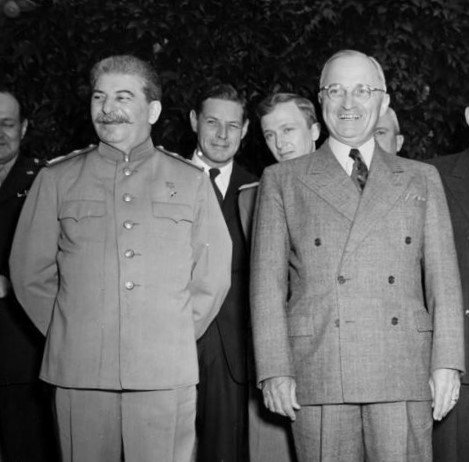Prof. Kathryn Weathersby

It seems odd that just a year after the end of the war, the Soviet Union and the United States would find themselves competing for the support of the German people, but that was the effect of the new superpower rivalry. As we discussed in the last post, Moscow desperately wanted Germany to remain united so that the Soviet Union could get reparations from the industrial regions in the Western zones. As the United States, Britain, and France took steps to coordinate occupation policy in their zones, the Soviets feared, quite correctly, that such measures would lead to the creation of a separate state out of the three Western zones.
To put pressure on the Western powers to deter them from dividing Germany, Moscow began to appeal to German public opinion. Already in the summer of 1946, Foreign Minister Molotov abruptly changed Moscow’s harshly punitive approach to the occupation and began instead to accuse the Western powers of plotting to prevent German unity and restoration. He claimed the United States was destroying German industrial potential by imposing restrictions on its coal and steel production. He called for the creation of a single German government while denouncing France for demanding that the industrial Ruhr area be detached from the rest of Germany. In their own zone, the Soviets posed as friends of German nationalism by allowing the Communist Party to challenge the postwar border with Poland, which had left about a third of German territory in the new Polish state. It was the Soviet Union that had redrawn this border at the end of the war, as a way to compensate Poland for land Moscow took in the East. It was thus important that the Soviets counter this reality by presenting themselves as the true champion of the German people.
In response to these efforts, Secretary of State Byrnes delivered a major speech in Stuttgart to a gathering of 1400 German dignitaries. He called for the economic rehabilitation of Germany to help the Germans win back “an honorable place among the free and peace-loving nations.” He announced that the French proposal to detach the Ruhr area would not be carried out and called for the prompt formation of a provisional government for all of Germany. The Secretary of State also endorsed German protests against the new Soviet-drawn border with Poland.
Despite their public statements in support of German unity, the Americans and British took steps to merge their zones. Nonetheless, at the Council of Foreign Ministers meeting in Moscow in March 1947, they made one last effort to reach an agreement with the Soviets on occupation policy for Germany that would avoid creating a separate state in the West. The most immediate concern of the Western allies was that Moscow refused to send foodstuffs to the Western zones from their agriculturally rich region in the East. As a result, American and British taxpayers had to provide food and other basic needs for the German population in the Western zones. The US and UK were therefore desperate to create a governing body in Germany that could make the country self-sufficient. At the same time, however, given the worldwide political rivalry with the Soviet Union, they did not want to suffer the political damage that would come from being seen as responsible for dividing the country.
The discussion at the Council of Foreign Ministers broke down over questions of how nationwide governing bodies for Germany should be established and who should run them. Nonetheless, since they wanted to be seen as supporting national unity in principle, the Soviets and Americans agreed to resume meetings of the Joint Commission in Seoul, as we discussed in Post #28. We will examine in the next post the reaction within Korea to the news that the Joint Commission would resume its meetings in the late spring of 1947.
[Sources: This post relies on the discussion of the German issue found in William R. Keylor, A World of Nations: The International Order Since 1945 (Oxford University Press, 2009)]